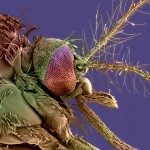Link to Pubmed [PMID] – 31120156
Med. Vet. Entomol. 2019 May;
Transinfections of the maternally transmitted endosymbiont Wolbachia pipientis can reduce RNA virus replication and prevent transmission by Aedes aegypti, and also have the capacity to invade wild-type populations, potentially reaching and maintaining high infection frequencies. Levels of virus transmission blocking are positively correlated with Wolbachia intracellular density. Despite reaching high densities in Ae. aegypti, transinfections of wAlbA, a strain native to Aedes albopictus, showed no blocking of Semliki Forest Virus in previous intrathoracic injection challenges. To further characterize wAlbA blocking in Ae. aegypti, adult females were intrathoracically challenged with Zika (ZIKV) and dengue viruses, and then fed a ZIKV-containing bloodmeal. No blocking was observed with either virus when challenged by intrathoracic injection. However, when ZIKV was delivered orally, wAlbA-infected females showed a significant reduction in viral replication and dissemination compared with uninfected controls, as well as a complete absence of virus in saliva. Although other Wolbachia strains have been shown to cause more robust viral blocking in Ae. aegypti, these findings demonstrate that, in principle, wAlbA could be used to reduce virus transmission in this species. Moreover, the results highlight the potential for underestimation of the strength of virus-blocking when based on intrathoracic injection compared with more natural oral challenges.

